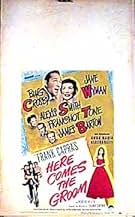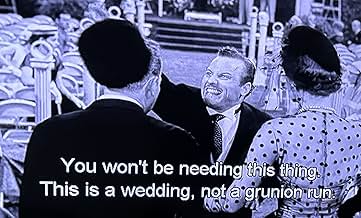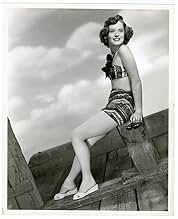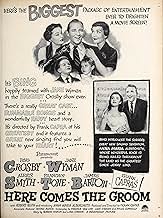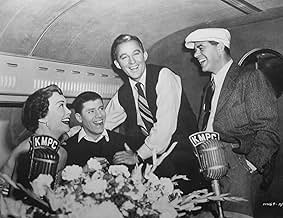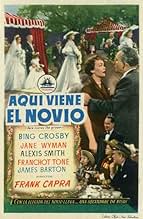AVALIAÇÃO DA IMDb
6,3/10
1,3 mil
SUA AVALIAÇÃO
Adicionar um enredo no seu idiomaForeign correspondent Pete Garvey has 5 days to win back his former fiancée, or he'll lose the orphans he adopted.Foreign correspondent Pete Garvey has 5 days to win back his former fiancée, or he'll lose the orphans he adopted.Foreign correspondent Pete Garvey has 5 days to win back his former fiancée, or he'll lose the orphans he adopted.
- Direção
- Roteiristas
- Artistas
- Ganhou 1 Oscar
- 3 vitórias e 5 indicações no total
Jacques Gencel
- Bobby
- (as Jacky Gencel)
Avaliações em destaque
Another Bing Crosby vehicle and another job for Frank Capra at Paramount, his last, Here Comes the Groom is a light and frilly affair that takes too long to do too little but is intermittently charming along the way. It's a largely unremarkable film that doesn't try to make a whole lot of sense, especially in its ending, but at least Crosby and Jane Wyman work well together.
Pete Garvey (Crosby) is a war correspondent still in Paris several years after the end of WWII, latching onto an orphanage of war orphans about whom he is writing a series of stories about in order to get them adopted and sending them back to his editor George (Robert Keith) who is getting tired of them since the world has moved on. He also has a girl back home, Emmadel (Wyman), who has grown sick of waiting for her beau to return and sends him a record of her voice telling him that she's leaving him. It's really the only fun bit of filmmaking in the whole thing since Capra has her superimposed on top of the record to speak the lines and even ends with a fun bit of nonsense around the mechanics of the player itself.
Well, Pete gets the bug to go back home, but not before he disappears for two months to find the birth certificates of his two favorite orphans Bobby (Jacques Gencel) and Suzi (Beverly Washburn). I think this is supposed to establish Pete as forgetful but dedicated, and yet the rest of the film is him laser focused on getting what he needs without wavering. It's almost like the script by Virginia Van Upp, Liem O'Brien, and Myles Connolly was kind of just slap-dashed together, or something.
Anyway, the only real reason to see this film is Crosby himself. He's a charming lead and much more in line with the tenor of the overall picture here than he had been in Riding High. Here, he's a lovable heel who needs to find a way to get back home, convince the woman he loves that she still loves him, and undermine her quickly scheduled marriage to Wilbur Stanley (Franchot Tone), the latest in the line of a wealthy and powerful Bostonian family. The competition that develops between Pete and Wilbur is friendly and leads to no real hard feelings on any front, even when Wilbur conspires to have the orphans adopted if and when Pete doesn't get married on time (a condition of the adoption since he's a bachelor). It's almost like none of the characters consider there to be anything like stakes around the place.
Well, the bulk of the film is Crosby charming his way back into Emmadel's heart (the first rendition of the Oscar winning song "In the Cool, Cool, Cool of the Evening" is a delightful narrative treat since it shows the two still having a connection that develops over the song), spruce up Wilbur's cousin (fourth-cousin once removed) Winifred (Alexis Smith) so that she can become attractive to Wilbur instead, all while George hangs around for little reason other than to give some funny quips now and then. The finale is the big, to do wedding with many important guests and some bit of farce to get Pete on the altar instead of Wilbur that everyone just accepts because the feelings of the orphans are important and this very real ceremony isn't real, or something. It makes just this side of no sense, made all the weirder by Wilbur's reaction to it all which is like he didn't care.
So, it's very slight. It has some real charm to it. It's loosely told and kind of nonsensical. It has a nice song that it overplays (I didn't need to hear "Evening" three times, but whatever, it's not like there's a whole lot else). It's primarily a vehicle to showcase Bing Crosby's charm, and it does that reasonably well.
I think it would have worked better at 90 minutes instead of 110, though.
Pete Garvey (Crosby) is a war correspondent still in Paris several years after the end of WWII, latching onto an orphanage of war orphans about whom he is writing a series of stories about in order to get them adopted and sending them back to his editor George (Robert Keith) who is getting tired of them since the world has moved on. He also has a girl back home, Emmadel (Wyman), who has grown sick of waiting for her beau to return and sends him a record of her voice telling him that she's leaving him. It's really the only fun bit of filmmaking in the whole thing since Capra has her superimposed on top of the record to speak the lines and even ends with a fun bit of nonsense around the mechanics of the player itself.
Well, Pete gets the bug to go back home, but not before he disappears for two months to find the birth certificates of his two favorite orphans Bobby (Jacques Gencel) and Suzi (Beverly Washburn). I think this is supposed to establish Pete as forgetful but dedicated, and yet the rest of the film is him laser focused on getting what he needs without wavering. It's almost like the script by Virginia Van Upp, Liem O'Brien, and Myles Connolly was kind of just slap-dashed together, or something.
Anyway, the only real reason to see this film is Crosby himself. He's a charming lead and much more in line with the tenor of the overall picture here than he had been in Riding High. Here, he's a lovable heel who needs to find a way to get back home, convince the woman he loves that she still loves him, and undermine her quickly scheduled marriage to Wilbur Stanley (Franchot Tone), the latest in the line of a wealthy and powerful Bostonian family. The competition that develops between Pete and Wilbur is friendly and leads to no real hard feelings on any front, even when Wilbur conspires to have the orphans adopted if and when Pete doesn't get married on time (a condition of the adoption since he's a bachelor). It's almost like none of the characters consider there to be anything like stakes around the place.
Well, the bulk of the film is Crosby charming his way back into Emmadel's heart (the first rendition of the Oscar winning song "In the Cool, Cool, Cool of the Evening" is a delightful narrative treat since it shows the two still having a connection that develops over the song), spruce up Wilbur's cousin (fourth-cousin once removed) Winifred (Alexis Smith) so that she can become attractive to Wilbur instead, all while George hangs around for little reason other than to give some funny quips now and then. The finale is the big, to do wedding with many important guests and some bit of farce to get Pete on the altar instead of Wilbur that everyone just accepts because the feelings of the orphans are important and this very real ceremony isn't real, or something. It makes just this side of no sense, made all the weirder by Wilbur's reaction to it all which is like he didn't care.
So, it's very slight. It has some real charm to it. It's loosely told and kind of nonsensical. It has a nice song that it overplays (I didn't need to hear "Evening" three times, but whatever, it's not like there's a whole lot else). It's primarily a vehicle to showcase Bing Crosby's charm, and it does that reasonably well.
I think it would have worked better at 90 minutes instead of 110, though.
This film is never considered one of Frank Capra's best, but that shouldn't keep potentially interested viewers from seeing it. On its face, it doesn't seem to be what has come to be known as a Capra film because it isn't issue-laden and doesn't really make a point other than the "follow your heart" admonition that most romantic comedies invoke. In many ways, it's a remake of Capra's "It Happened One Night" (1934), and while it doesn't have the financially and emotionally gut-wrenching backdrop of the Depression to give it the weight of the original, it's nonetheless pleasant and clever.
To appreciate "Here Comes the Groom" is to embrace a bunch of disparate parts. First and foremost, this is a Bing Crosby film, replete with seemingly ad-libbed asides that filled the Hope/Crosby "Road" pictures. Bing, who plays a newspaper reporter (one of Capra's favorite devices) but basically plays himself, has as his foil not just one but three adult characters (his editor, his would-be father-in-law and his romantic competitor), plus a passel of kids, in particular a French boy and girl whom he has virtually adopted as his own. The two kids are cute and genuinely good-natured, so when they are on screen, as they often are, they light up the place. Their repeated mimicry of the Crosby character's signature farewell gesture -- a tooth-filled smile and open-fingered hand wave -- never fails to please (except for the final time, in the film's closing seconds, in which it appears that the duo is starting to run out of steam).
Jane Wyman is a strong presence in the film as well, and quite appealing as someone torn between an elusive true love and the biological clock. She is every bit the musical equal of Crosby in their imaginatively choreographed presentation of the movie's theme song "In the Cool, Cool, Cool of the Evening," staged in various parts of a huge office, then down a half-dozen floors in an elevator and out to the street.
Franchot Tone is the other big name among the actors, and he plays his role as Wyman's rich fiance with characteristic aplomb. Nothing seems to rattle Tone's character, even the possibility of losing Wyman, which may be part of the film's "follow your heart" message.
Easily outshining Tone is Alexis Smith, who never received the career-making, starring roles that she deserved. She plays a caterpillar whom Crosby, in his own strategic interest, turns into a butterfly, and while Crosby's tutelage is over-the-top sexist by today's standards, her transformation and resulting passion are eye-popping, for the Tone character and his staid relatives as well as for the viewer.
With such stong characterizations and actors, Capra for some reason decided he needed something more, so he threw in a grab bag of other elements. Before Crosby and his two adoptees fly back to the States, there's an extended operatic solo by the quite young and show-stopping Anna Maria Alberghetti. And when Crosby and the youthful pair finally get on the plane, they happen to sitting next to a group of USO entertainers, so of course there's a song, "Cristofo Columbo," which brings in fleeting contributions by Louis Armstrong, Frank Fontaine, Dorothy Lamour and Phil Harris. These are tangents, to be sure, and they make the viewer wonder momentarily if Capra has lost his narrative thread, but they don't last long and are engaging in their own right. (Perhaps the "Cristofo Columbo" scene is supposed to echo the "Man on the Flying Trapeze" scene from "It Happened One Night.")
Those looking for further Capra touches will be warmed by the brief appearances of H.B. Warner (the judge in "Mr. Deeds," a senator in "Mr. Smith" and Mr. Gower in "It's a Wonderful Life"), Charles Lane (Potter's real-estate man in "Wonderful Life") and Charles Halton (bank examiner in "Wonderful Life"). The cinematography in this film is serviceable, but there are frustrating instances of sloppiness. At one point, in a reaction shot, the camera mysteriously lingers on Crosby's editor as he does nothing for about five seconds. It's an inconsequential flub, but it feels long enough to make the viewer wonder if the film's cutter and Capra himself just went to sleep. (It's reminiscent of a similar and even longer gaffe in Capra's "You Can't Take It with You" from 1938.)
A more egregious example of visual inattention comes during a physical argument between the Wyman and Smith characters. For the actual fight, in which the two flip each other over with quick arm twists, it's all too obvious that stunt doubles are used. The doubles' faces, which look nothing like those of the two actresses (they may even be men), are repeatedly shown, and the hair color and length of the Smith double doesn't come close to matching the hair of Smith. Who was minding the store when this was shot? It's the kind of mistake that makes all kinds of viewers, not just movie buffs, roll their eyes.
To its credit, the film does lay out, in albeit cliche form, the reality of class differences. But both rich and not-so-rich are given gentle appreciative treatment. Clearly, the viewer is supposed to side with the more down-to-earth characters of Crosby and Wyman, but the rich are not cardboard villains, either. It's almost as if the message is that there is a time and place (and hope) for people from all walks of life.
"Here Comes the Groom" (a clever title in itself) is a product of the pop culture of its time; it's all-white (save for Armstrong), and traditional gender roles hold sway. But look beyond that and you will find a film that you probably didn't know you would like so well. Crosby, as top comic banana, plays his likeable persona perhaps better than ever, and the film leaves lots of smiles in its wake. The ending may be predictable, but this is a movie in which it's just fun to see the character-based twists and turns that steer the plot to its conclusion.
To appreciate "Here Comes the Groom" is to embrace a bunch of disparate parts. First and foremost, this is a Bing Crosby film, replete with seemingly ad-libbed asides that filled the Hope/Crosby "Road" pictures. Bing, who plays a newspaper reporter (one of Capra's favorite devices) but basically plays himself, has as his foil not just one but three adult characters (his editor, his would-be father-in-law and his romantic competitor), plus a passel of kids, in particular a French boy and girl whom he has virtually adopted as his own. The two kids are cute and genuinely good-natured, so when they are on screen, as they often are, they light up the place. Their repeated mimicry of the Crosby character's signature farewell gesture -- a tooth-filled smile and open-fingered hand wave -- never fails to please (except for the final time, in the film's closing seconds, in which it appears that the duo is starting to run out of steam).
Jane Wyman is a strong presence in the film as well, and quite appealing as someone torn between an elusive true love and the biological clock. She is every bit the musical equal of Crosby in their imaginatively choreographed presentation of the movie's theme song "In the Cool, Cool, Cool of the Evening," staged in various parts of a huge office, then down a half-dozen floors in an elevator and out to the street.
Franchot Tone is the other big name among the actors, and he plays his role as Wyman's rich fiance with characteristic aplomb. Nothing seems to rattle Tone's character, even the possibility of losing Wyman, which may be part of the film's "follow your heart" message.
Easily outshining Tone is Alexis Smith, who never received the career-making, starring roles that she deserved. She plays a caterpillar whom Crosby, in his own strategic interest, turns into a butterfly, and while Crosby's tutelage is over-the-top sexist by today's standards, her transformation and resulting passion are eye-popping, for the Tone character and his staid relatives as well as for the viewer.
With such stong characterizations and actors, Capra for some reason decided he needed something more, so he threw in a grab bag of other elements. Before Crosby and his two adoptees fly back to the States, there's an extended operatic solo by the quite young and show-stopping Anna Maria Alberghetti. And when Crosby and the youthful pair finally get on the plane, they happen to sitting next to a group of USO entertainers, so of course there's a song, "Cristofo Columbo," which brings in fleeting contributions by Louis Armstrong, Frank Fontaine, Dorothy Lamour and Phil Harris. These are tangents, to be sure, and they make the viewer wonder momentarily if Capra has lost his narrative thread, but they don't last long and are engaging in their own right. (Perhaps the "Cristofo Columbo" scene is supposed to echo the "Man on the Flying Trapeze" scene from "It Happened One Night.")
Those looking for further Capra touches will be warmed by the brief appearances of H.B. Warner (the judge in "Mr. Deeds," a senator in "Mr. Smith" and Mr. Gower in "It's a Wonderful Life"), Charles Lane (Potter's real-estate man in "Wonderful Life") and Charles Halton (bank examiner in "Wonderful Life"). The cinematography in this film is serviceable, but there are frustrating instances of sloppiness. At one point, in a reaction shot, the camera mysteriously lingers on Crosby's editor as he does nothing for about five seconds. It's an inconsequential flub, but it feels long enough to make the viewer wonder if the film's cutter and Capra himself just went to sleep. (It's reminiscent of a similar and even longer gaffe in Capra's "You Can't Take It with You" from 1938.)
A more egregious example of visual inattention comes during a physical argument between the Wyman and Smith characters. For the actual fight, in which the two flip each other over with quick arm twists, it's all too obvious that stunt doubles are used. The doubles' faces, which look nothing like those of the two actresses (they may even be men), are repeatedly shown, and the hair color and length of the Smith double doesn't come close to matching the hair of Smith. Who was minding the store when this was shot? It's the kind of mistake that makes all kinds of viewers, not just movie buffs, roll their eyes.
To its credit, the film does lay out, in albeit cliche form, the reality of class differences. But both rich and not-so-rich are given gentle appreciative treatment. Clearly, the viewer is supposed to side with the more down-to-earth characters of Crosby and Wyman, but the rich are not cardboard villains, either. It's almost as if the message is that there is a time and place (and hope) for people from all walks of life.
"Here Comes the Groom" (a clever title in itself) is a product of the pop culture of its time; it's all-white (save for Armstrong), and traditional gender roles hold sway. But look beyond that and you will find a film that you probably didn't know you would like so well. Crosby, as top comic banana, plays his likeable persona perhaps better than ever, and the film leaves lots of smiles in its wake. The ending may be predictable, but this is a movie in which it's just fun to see the character-based twists and turns that steer the plot to its conclusion.
Frank Capra in his autobiography called Bing Crosby, "the master of the cultured ad-lib." A lot of time Crosby would drop several ad-libs into a script and Capra kept them in. According to Capra they were better
than what the screenwriter had written. Of course partnering with Bob Hope in several films and thousands of radio, television, and live shows Bing had to be quick on the uptake.
Capra wanted to do another of his populist films like Mr. Deeds etc., in the three picture deal he signed with Paramount. But after doing Riding High and doing it well with Bing Crosby, he wanted to do one of his type film. The Paramount brass said no, but since he was unhappy at Paramount they agreed to drop their last picture commitment on his contract for one more Crosby film. Just make a good one.
Capra was as good as his word. This film is entertainment plus and a lot of that has to do with the chemistry between Bing and Jane Wyman. Most of Crosby's leading ladies were nice women who just melted with the Crosby charm. Not so here. Ms. Wyman gives as good with the wisecracks as Crosby does and is no pushover. What she is here is a fiancé who's grown tired of waiting for her man who's out gallivanting all over the world as per his job as correspondent. When he finally does come back he has two French orphans in tow. But Jane's decided to marry millionaire Franchot Tone. Bing has to get her back or those kids will be deported. That's where the fun starts.
By now Paramount was giving Crosby vehicles some respectable budgets and that included letting Frank Capra hire a lot of his favorite supporting players. Those folks make a Capra film an enjoyable experience.
Franchot Tone does nicely as millionaire rival and critics were astounded at Alexis Smith who turned out to have a real flair for comedy. Funny parts she wasn't getting at Warner Brothers. She plays a "kissing" cousin of Franchot Tone and figures prominently in Bing's machinations.
They were also astounded at Jane Wyman who nobody realized could sing. Why they were is beyond me since she did start in musical choruses. The song In the Cool Cool Cool of the Evening by Hoagy Carmichael and Johnny Mercer won an Oscar for best song and became one of Bing's million selling records, dueted with Jane Wyman on screen and on vinyl.
The rest of the score is by Jay Livingston and Ray Evans who were under contract to Paramount and for some reason or other never wrote another Crosby film score. Probably because Paramount didn't assign them because many years later they scored and arranged a whole album of duets with Bing and Rosemary Clooney called That Traveling Two Beat Time. And Bing did pretty good with a song written for his friend Bob Hope by them called Silver Bells.
One of the Livingston-Evans songs was a patented philosophical number called Your Own Little House. A nice song on record, on screen it's a great impromptu style number that so many of Crosby's seemed to be. Sung with a group of kids who are French war orphans, Bing does some gentle kidding of fellow entertainers Jimmy Durante and Maurice Chevalier.
This is one of Bing's best and great entertainment.
than what the screenwriter had written. Of course partnering with Bob Hope in several films and thousands of radio, television, and live shows Bing had to be quick on the uptake.
Capra wanted to do another of his populist films like Mr. Deeds etc., in the three picture deal he signed with Paramount. But after doing Riding High and doing it well with Bing Crosby, he wanted to do one of his type film. The Paramount brass said no, but since he was unhappy at Paramount they agreed to drop their last picture commitment on his contract for one more Crosby film. Just make a good one.
Capra was as good as his word. This film is entertainment plus and a lot of that has to do with the chemistry between Bing and Jane Wyman. Most of Crosby's leading ladies were nice women who just melted with the Crosby charm. Not so here. Ms. Wyman gives as good with the wisecracks as Crosby does and is no pushover. What she is here is a fiancé who's grown tired of waiting for her man who's out gallivanting all over the world as per his job as correspondent. When he finally does come back he has two French orphans in tow. But Jane's decided to marry millionaire Franchot Tone. Bing has to get her back or those kids will be deported. That's where the fun starts.
By now Paramount was giving Crosby vehicles some respectable budgets and that included letting Frank Capra hire a lot of his favorite supporting players. Those folks make a Capra film an enjoyable experience.
Franchot Tone does nicely as millionaire rival and critics were astounded at Alexis Smith who turned out to have a real flair for comedy. Funny parts she wasn't getting at Warner Brothers. She plays a "kissing" cousin of Franchot Tone and figures prominently in Bing's machinations.
They were also astounded at Jane Wyman who nobody realized could sing. Why they were is beyond me since she did start in musical choruses. The song In the Cool Cool Cool of the Evening by Hoagy Carmichael and Johnny Mercer won an Oscar for best song and became one of Bing's million selling records, dueted with Jane Wyman on screen and on vinyl.
The rest of the score is by Jay Livingston and Ray Evans who were under contract to Paramount and for some reason or other never wrote another Crosby film score. Probably because Paramount didn't assign them because many years later they scored and arranged a whole album of duets with Bing and Rosemary Clooney called That Traveling Two Beat Time. And Bing did pretty good with a song written for his friend Bob Hope by them called Silver Bells.
One of the Livingston-Evans songs was a patented philosophical number called Your Own Little House. A nice song on record, on screen it's a great impromptu style number that so many of Crosby's seemed to be. Sung with a group of kids who are French war orphans, Bing does some gentle kidding of fellow entertainers Jimmy Durante and Maurice Chevalier.
This is one of Bing's best and great entertainment.
"Here Comes the Groom" is the sort of schmaltzy fluff that Bing Crosby did best. While I am quick to admit that this is a very slight film, it is also a very, very enjoyable film. Deep? Nah--but fun.
The film begins with Bing hanging out with a bunch of cute orphans in post-war France. He's supposed to be coming back to the USA to marry his fiancée (Jane Wyman) but he cannot leave the kids in a lurch--particularly two cute kids who he plans to adopt. The only trouble is that after he's done all the paperwork to bring them to America, he's returned so late that his girlfriend has called off the wedding and is now planning to marry her boss (Franchot Tone). You really can't blame her too much--Bing never told her he'd be late or why he'd be late. In other words, she wasn't feeling very appreciated.
There is a problem with Bing not getting married, however. In order to adopt the kids and keep them he MUST get married...and quick. Bing isn't about to try to find another girl and he really does care about Jane, so he's determined to break up the engagement and marry her himself. Here is where it gets interesting--Bing tells Franchot and Franchot actually allows him a chance to win her back. After all, if she isn't 100% ready to marry him, why not let her marry Bing? Where all this ends is very predictable--but a film like this always is. Along the way, you have some nice comedy (particularly the portions with Alexis Smith) and really nice songs--and it's quite enjoyable and cute. Perhaps it's too cute and saccharine for some--I could understand that. But, if you don't mind and are looking for an old fashioned family film, it's well worth your time.
The film begins with Bing hanging out with a bunch of cute orphans in post-war France. He's supposed to be coming back to the USA to marry his fiancée (Jane Wyman) but he cannot leave the kids in a lurch--particularly two cute kids who he plans to adopt. The only trouble is that after he's done all the paperwork to bring them to America, he's returned so late that his girlfriend has called off the wedding and is now planning to marry her boss (Franchot Tone). You really can't blame her too much--Bing never told her he'd be late or why he'd be late. In other words, she wasn't feeling very appreciated.
There is a problem with Bing not getting married, however. In order to adopt the kids and keep them he MUST get married...and quick. Bing isn't about to try to find another girl and he really does care about Jane, so he's determined to break up the engagement and marry her himself. Here is where it gets interesting--Bing tells Franchot and Franchot actually allows him a chance to win her back. After all, if she isn't 100% ready to marry him, why not let her marry Bing? Where all this ends is very predictable--but a film like this always is. Along the way, you have some nice comedy (particularly the portions with Alexis Smith) and really nice songs--and it's quite enjoyable and cute. Perhaps it's too cute and saccharine for some--I could understand that. But, if you don't mind and are looking for an old fashioned family film, it's well worth your time.
"Here Comes the Groom" was a surprise when it was shown by TCM recently. This film brings together two talented men, Frank Capra and Bing Crosby. This light comedy, with some music, is seldom seen these days, and it's a shame. Although not one of the best films of the director, the film is entertaining and fun to watch.
The great achievement of Mr. Capra was the way he brought together a fabulous cast that work well together. Bing Crosby shows why he was one of the best performers of his time. He is always charming and generous to his fellow players. The other surprise in the film is Jane Wyman. Playing a light role she is delightfully playful as the woman who has found a rich man who wants to make her his wife, but she is still in love with the absent Pete Garvey, who just happens to reappear with two cute war orphans that immediately "adopt" her as their mother.
The other principals, Franchot Tone and Alexis Smith, are in terrific form. Ms. Smith, especially, is a delight to watch. It's a shame Hollywood didn't give her better vehicles in which to shine. Mr. Tone is suave as Wilbur Stanley, the millionaire who finds out in the worst way, his bride-to-be is in love with another man.
Another coup of Mr. Capra is the way he brings a lot of those excellent character actors that had worked with him in other films. Such is the case with Charles Lane, H.B. Warner, Charlest Halton, among others. There is a nice sequence that takes place in the plane that is bringing Pete back to America in which he sings a number with Phil Harris, Frank Fontaine, and Dorothy Lamour. Also in the early part of the film we saw a young and beautiful Anna Maria Alberghetti singing.
"Here Comes the Groom" shows why Frank Capra was one of the best directors, and it also helped that he had Bing Crosby on board.
The great achievement of Mr. Capra was the way he brought together a fabulous cast that work well together. Bing Crosby shows why he was one of the best performers of his time. He is always charming and generous to his fellow players. The other surprise in the film is Jane Wyman. Playing a light role she is delightfully playful as the woman who has found a rich man who wants to make her his wife, but she is still in love with the absent Pete Garvey, who just happens to reappear with two cute war orphans that immediately "adopt" her as their mother.
The other principals, Franchot Tone and Alexis Smith, are in terrific form. Ms. Smith, especially, is a delight to watch. It's a shame Hollywood didn't give her better vehicles in which to shine. Mr. Tone is suave as Wilbur Stanley, the millionaire who finds out in the worst way, his bride-to-be is in love with another man.
Another coup of Mr. Capra is the way he brings a lot of those excellent character actors that had worked with him in other films. Such is the case with Charles Lane, H.B. Warner, Charlest Halton, among others. There is a nice sequence that takes place in the plane that is bringing Pete back to America in which he sings a number with Phil Harris, Frank Fontaine, and Dorothy Lamour. Also in the early part of the film we saw a young and beautiful Anna Maria Alberghetti singing.
"Here Comes the Groom" shows why Frank Capra was one of the best directors, and it also helped that he had Bing Crosby on board.
Você sabia?
- Curiosidades"In the Cool, Cool, Cool of the Evening" was the fourth song performed by Bing Crosby in a film that went on to win the Academy Award for Best Song.
- Erros de gravaçãoWhen Winifred seeks shelter in Garvey's home, George is on the phone. In a close-up, the phone is to his ear, but in the next medium shot, the phone is hung up, and he picks up the receiver again.
- Citações
Husband on Airplane: [Complaining about fellow passenger Bing Crosby's singing on plane] Oh... There they go again ! Don't these actors ever stop making noises?
Wife on Airplane: They're USO people. They sing for soldiers.
Husband on Airplane: Soldiers can shoot back. They've got guns.
- ConexõesFeatured in Paramount Presents (1974)
- Trilhas sonorasMisto Cristofo Columbo
Written by Ray Evans and Jay Livingston
Performed by Bing Crosby, Dorothy Lamour, Louis Armstrong, Cass Daley,
Phil Harris, Frank Fontaine
Principais escolhas
Faça login para avaliar e ver a lista de recomendações personalizadas
- How long is Here Comes the Groom?Fornecido pela Alexa
Detalhes
- Data de lançamento
- País de origem
- Idiomas
- Também conhecido como
- Here Comes the Groom
- Locações de filme
- Empresa de produção
- Consulte mais créditos da empresa na IMDbPro
Bilheteria
- Orçamento
- US$ 2.117.000 (estimativa)
- Tempo de duração1 hora 53 minutos
- Cor
- Proporção
- 1.37 : 1
Contribua para esta página
Sugerir uma alteração ou adicionar conteúdo ausente

Principal brecha
By what name was Órfãos da Tempestade (1951) officially released in India in English?
Responda

